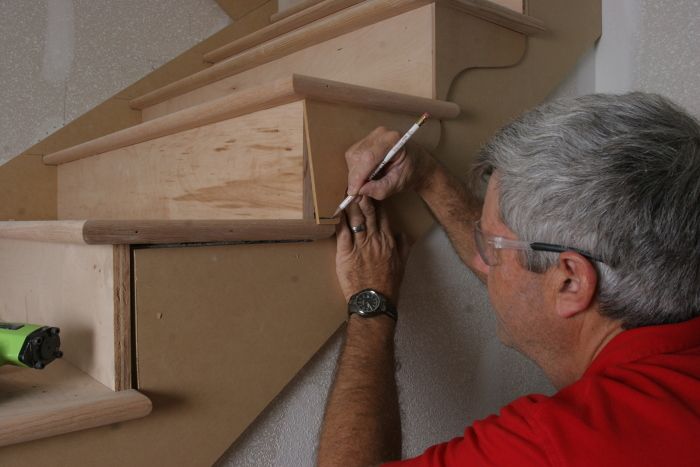
A question occasionally asked of the magazine is, “How do I become a carpenter?” I can answer this because I’ve done it, and I know a lot of other people who have as well. And this is a great time to become a carpenter. The economy seems to be rebounding, with the Bureau of Labor Statistics predicting a 24% increase in the demand for carpenters between now and 2022, and the contractors I know moaning that they can’t find good help.
Unlike many careers, there is no one, obvious path for someone starting from scratch. The more knowledge you can bring to the table, the better. Having gone to trade school can be a big leg up, but most residential carpenters learn the job by starting out as a laborer or carpenter’s helper for a small builder. Knowledge aside, in my own experience and through conversations I’ve had with contractors, the single most important attribute for an entry-level carpenter is attitude. Skills can be learned. A bad attitude is a permanent flaw. Attitude can overcome inexperience. Attitude can overcome prejudices.
Here’s advice I wish I’d gotten 35 years ago when I was first looking to become a carpenter. While want ads in the newspaper and on Craigslist can lead to work, the kind of employer they help you find is random. Hire on with the wrong company, and you can waste a lot of time learning little, or worse, learning bad methods that you don’t have the experience to vet. Be selective. Many of the better construction companies don’t advertise for help, doing their hiring through word of mouth. If you have any contacts in the trades, use them if only to inquire about who might be good to work for. Look at the construction companies in your area and figure out which ones do work that interests you, and where you think you might fit in. A company’s website may provide insight.
Call the companies that seem likely, speak to the boss, and try to set up an appointment to meet him or her in person. It can take hutzpah to get your foot in the door, but showing drive and initiative also makes a good first impression. Show up on time, dressed neatly but appropriately for the job, with a fresh haircut and your phone turned off. Let me repeat that – with your phone turned off. Offer your hand, and be polite. Be honest about your skills. Say that you are willing to work in the heat and the cold, in the rain and the snow, that you don’t mind sweeping up or schlepping lumber, and that you sincerely want an opportunity to learn the trade. At the end of the interview, say thank you and shake hands again. If you felt good about the company, even if they aren’t hiring right now, follow up with a phone call or email (properly punctuated and capitalized) in a couple of days. People with polite, professional, attitudes stand out, as much as I hate to say this, especially in construction.
When you get that job, show up on time, neatly dressed, with your tools, and with your lunch so you don’t have to leave the site midday. Turn your phone off, bust your keester, don’t whine, and soak up every bit of knowledge you can. And, as I have for 30 years, read Fine Homebuilding. When you’ve learned all you can from that job, don’t hesitate to move on to a more challenging employer, but without burning bridges if that’s possible. That’s most of what it takes.
Fine Homebuilding Recommended Products
Fine Homebuilding receives a commission for items purchased through links on this site, including Amazon Associates and other affiliate advertising programs.

8067 All-Weather Flashing Tape

Reliable Crimp Connectors

Handy Heat Gun
























View Comments
Nice post, Andy. I couldn't agree more. Attitude trumps experience. Simply by caring about doing good work, a rookie can quickly outperform a veteran who doesn't give a damn. I would like to add two additional bits of advice.
First, talk to the salesmen at the lumberyards, and ask them which builders are doing the best work. Those are the people you want to work for. Second, if it's at all possible, before committing to a job, see if you can talk to some of the employees.
Early in my career, I took a job with a company at sounded terrific in the words of the guy who hired me. But on the first day, I asked my foreman if it was a good company to work for. He said, 'Well, this is my last week here. Does that tell you anything?"
Kevin, the bit about lumberyard salesmen is dead nuts on. Those people know everyone, and they're great connections to have later on. When I started out in my own business, a friend who was a salesman sent a ton of work my way. I don't know if I'd have survived the first year without him.
Becoming a carpenter so that you work for somebody else is one thing, becoming self-employed as a carpenter is quite a different thing.
To start out working for somebody else attitude, attention to detail, and awareness of surroundings are critical. I'll teach somebody the ropes but I expect you to pay attention at all times, to take safety seriously, to seek out new knowledge whenever you can, and to learn to anticipate when and where you can be helpful. Don't sit on your hands and wait for every step to be dictated. If I've shown you once that means we're going to do it again and I expect you to be ready for it. Read magazines and books and watch videos until you are blue in the face. We can talk about it on the way to a job or during a break. Be in the moment--don't have that phone in your hand unless you're calling 911.
If you've already gained skill and expertise in carpentry and you want to go out on your own, there are other skillsets you'll need. You need to have working knowledge of other trades to work with them. You had better know accounting, accounting software, and at least be familiar with sales and marketing techniques. Whatever you don't know you'd better have a partner or paid adviser who does. You better have the working capital to pay for the insurance, the licenses, the equipment and the professionals you'll need to run your business. You'll need nerves of steel to weather the dry periods of business, you'll need the ability to bite your tongue so hard it nearly falls off when talking to customers, officials and fellow tradespeople, and you'll need the ability to tolerate physical pain so great that you don't know if you can get out of bed in the morning and do this all over again.
I am a teacher at Madison Area Technical College in Madison Wi. We teach a one year technical diploma in Construction and Remodeling. We build a Net Zero Ready home with the students, while teaching them all the basic skills. Our grads go on to find fulfilling careers in residential and commercial. We've had great success finding our grads jobs over the last couple of years. There are many technical colleges doing something similar to us. Find those programs and support them and hire their grads.
Excellent Post, but I want to apply it to other industries as well. I've been in software for 35 years. While the trade specifics are different, the fundamentals are identical. I'll work with a newbie with a great attitude and work ethic any day over a more seasoned 'pro' with a poor attitude and poor work habits. Nice Post, Andy.
Excellent point of view, well written. Having worked with countless young men and women over the years I would add that when you show someone how to do something its the extraordinary individual who gets it right away. When you find that rare unpolished diamond guard them carefully, or better yet give them my email address. Most people repeat a task two or three times before they get it right and are comfortable, so this demands patience on the part of the instructor and perseverance on the part of the helper. Watching someone grow in this process makes getting up every day and going to work like heaven; working with a scattered airhead is like frying in hell.